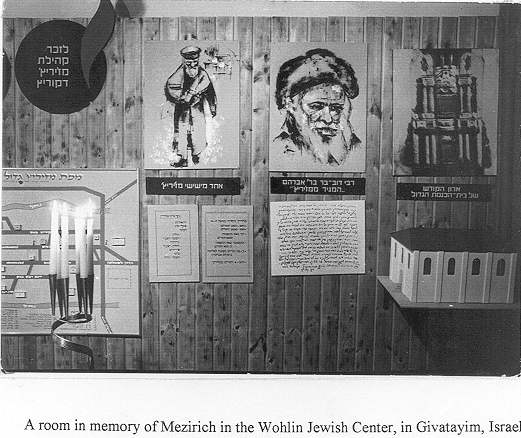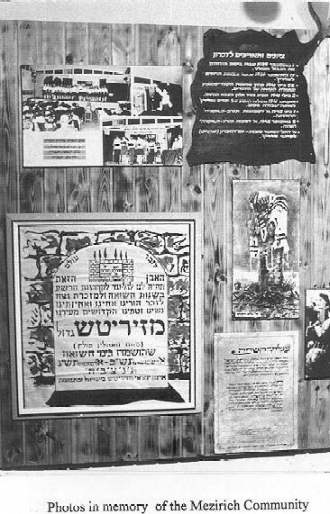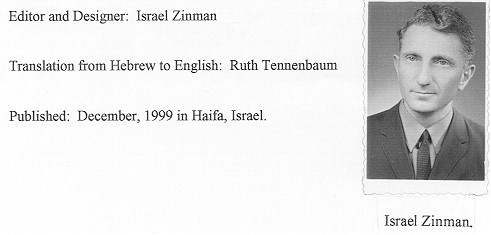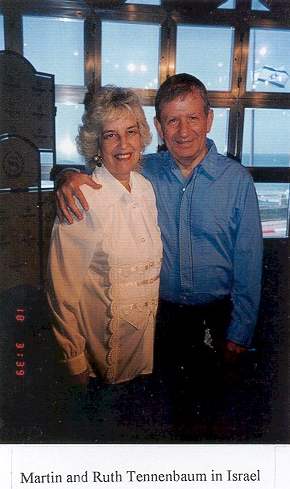Previous Page
THE LIFE HISTORY OF A HOLOCAUST SURVIVOR FROM MEZIRICH
By Mordechai Tennenbaum
I was born a week
before Pesach (Passover) (that's how I remember my parents referring to my
birthdate) in April of 1933, in the City of Rowne, Poland. Today that city is
called Rovno, and is part of the Ukraine. My parents were Riva (Rivka) nee
Tessler and Froyim (Ephraim) Tennenbaum (spelled Tenenbojm in Polish in those
days).
My father hailed from a small town in the vicinity called Tuczyn or Tuchyn, and
we lived in Miedzyrzec or Mezirich, my mother's home town. We lived in a big
brick, fairly new house on the main street of the town, my mother and father,
my younger brother Srulik (or Israel), 1½ years my junior, and my
grandparents on my mother's side, Shaya and
Marm-Ruchzie (Isaiah and Miriam-Rachel) Tessler.
As far as I can remember, we lived a very good and easy life. Father worked as
a foreman of a flour mill in the village of Drozdow and was away during most of
the week, but on weekends, he used to come home and I can distinctly remember
going with him to Synagogue and watching him perform the Cohen's blessing. I
also remember being a very poor eater and how I used to be chased with every
spoonful of food. We had a big fruit orchard and garden behind the house and
some land outside of town and I can remember spending many happy times in those
surroundings. Summers we used to go away on vacation to some resort called
"dacha" and for shopping we used to go to the big city of Rovno some
40 km. away or some half day's travel by bus in those days.
At the age of 5 in the Fall of 1938, 1 started attending kindergarten at the
Hebrew School called "Tarbut". Little did I know then that by the
time the next school year would start, world events would take such a course as
to change so drastically my idyllic way of life described so far.
The war, which broke out in 1939, when Germany attacked Poland, was hardly felt
in our small town except for the fact that Poland ceased to exist as a state
and its territory divided between Germany and Russia. Our town came under
Russian occupation on Sept. 17, 1939, but from a child's recollection, I cannot
remember any major changes in our lives, except for my having to attend Grade I
in a Yiddish-oriented school rather than in the Hebrew-oriented
"Tarbut" School. Also, after completing the year, I guess the Yiddish
School was closed down for I found myself repeating Grade I for a second time,
this time in a Russian School, established in what used to be Stetzki's Palace,
a very impressive estate on a hill surrounded by beautiful gardens. It was
during that year that I remember being on the stage for the first time
(something that I would return to do in later years) in some school play, and
afterwards walking home in the snow with my parents.
That was the end of my schooling for awhile, for in the summer of 1941, the
war broke out between Germany and Russia and we were occupied by the Germans on
July 2, 1941.
During the early days of the war, some Jews packed up and travelled east with
the retreating Russians, but like most of the townspeople, our family decided
to stay behind because how can one just pick up and leave a home and all one
has built up through the years. Besides, no one in his wildest imagination
could foresee what living under the German occupation would be like.
Well, the Germans came in and it didn't take long before their presence was
felt. Demands began coming in for the surrender of valuables, gold, silver,
etc., people were taken to forced labor, Jewish children were not allowed to go
to school, and Jews were forced to wear the yellow star of David. One of the
labor demands was to knit for the Germans various apparel, such as sweaters,
scarves, gloves, etc. I remember seeing almost everyone knit. As a child, it
caught my fancy, and I, too, learned the trade, a trade that proved to be of
great importance later on.
Life continued thus for almost a year, and then, just before the holiday of
Shavuot, panic began in town as word spread that the Germans were catching
young people in the streets for forced labor. They were told to bring pails and
shovels as piles of grain not too far from town which had become wet, had to be
spread out to dry. The day was a Tuesday, and although I didn't see it with my
own eyes, on that day my father, mother and grandfather were rounded up, never
to be seen again. It was only later that we learned that they were really taken
to a nearby place near the village of Nevirkov to dig the mass graves for
themselves and for the rest of the people of the town.
All through that Tuesday, Wednesday, and Thursday, we awaited some news of our
loved ones but none came. Then early Friday morning, May 22, 1942, my little
brother and I were awakened to a terrible banging on the door and the screams
"Raus" or "Out' '. We were pushed outside and shown to go onto
the street. Young as we were, 71/2and 9, we felt we had to run and hide, so we
made our way to the bottom of the orchard where we used to play hide-and-seek.
Unfortunately, the Germans saw us and made us turn back to the street, where we
saw groups of Jews being led away by one or two S.S. soldiers. As we passed the
houses of my uncles and aunts across the street from our house, among the
relatives being driven out from those houses was also our grandmother, who had
gone there earlier to inquire about news of the ones grabbed on the first day.
As we were being escorted thus, some instinct told my childish mind that some
terrible fate is awaiting us and that I must somehow escape. I told my brother
to sneak away between a pair of houses, I would sneak away between the next
pair, and we would meet up behind them. He did as I told him but was caught by
the Germans and turned back, but me the German didn't notice at first and I
ran. By the time he did notice and started shooting, I was already out of reach.
I made my way back to our house and hid in the orchard where I first wanted to
hide. I stayed there through the rest of the day and that night. The next
morning, a neighboring Ukrainian woman noticed me, brought me some food and
informed my mother's a cousin, Srulik Tessler, a boy of 12, who also managed to
escape, of my existence. He came to see me and told me that it was all right to
come out as the Germans were no longer rounding up people. Later on, we were
joined by his older sister, Haike, a young widow of 27, who had escaped earlier
to a friendly Ukrainian farmer's place and thus survived.
From then on, the three of us were the new family. The surviving Jews were
ordered to concentrate in two side streets of the town, so we collected
whatever belongings were left over by the pillaging Ukrainians and moved into
some house of which the original inhabitants were no longer among the living.
It was not easy for Haike to maintain this new family unit and after she had
found out (I don't know to this very day how) that my father's two sisters and
families had survived the first massacre in Tuchyn, she sent me off with some
young Ukrainian girl to Tuchyn to join them. I remember vaguely the two-day 30
km walk with her and the sight of the mass graves, which we passed along the
way.
I don't remember much of my stay in Tuchyn, but I think I stayed with Aunt
Frieda and family. I guess I wasn't very happy there for these people were
strangers to me and I longed for Mezhirich and wanted to be with Haike and
Srulik beside whom I had grown up. I remember sending Haike a note, telling her
I was coming back, and I did, but how I can't recall.
By that time, there were rumors circulating that another massacre, or
"Akzion" as it was called, was about to take place and Haike began
trying
to find us a place at some friendly farmer's to hide. Our families had been in
the grain business, so we knew many Ukrainian farmers in the surrounding
villages. It wasn't easy to find a farmer who would agree to take in a woman
with two small boys, but one finally did, Andrei
Cheremucha of the Village Charaluv in the Mezhirich Region. One evening, the
farmer's wife, Nastia, and oldest son, Valentin (Varusha) came into town,
brought us Ukrainian farmer's clothes, which we put on and left the town by
horse and buggy as Ukrainian farmers. Two or three days later, on Sept. 26,
1942 (first day of the holiday of Succot), the remaining Jews of the town were
rounded up and shot and buried in mass graves.
We were in hiding at the Cheremuchas' house for some nine months, spending the
days in perhaps a square yard area under the kitchen oven, which had previously
served for drying firewood. The farmer's wife took in knitting jobs in the
village as if to do it herself, but actually the 3 of us knitted the items in
almost complete darkness under that oven. The extra income helped the farmer
feed the additional 3 mouths. Only at night did we leave the hiding place to
stretch our legs and go to the toilet.
There were sudden visits of Germans to the farmer's house, and we thought we
were all done for, but somehow, we were never discovered. Still, the farmer
started fearing for his own family (his wife Nastia and his 3 small children,
Varusha, Raya and Ira), for every time Jews were discovered in hiding at a
farmer's, the farmer and his family were killed together with the Jews. At
first, the farmer transferred us to the loft of some shed on his field, but
supplying us with food there proved to be quite a dangerous undertaking, and
eventually, he came to the decision that we had to leave. We were supplied with
food and water for a couple of days and told to go in a certain direction where
we were bound to run into partisan groups who had become active at that time.
It was the summer of 1943, and to be out in the fresh air (even if we walked
only at night) after all these months of sitting cooped up was wonderful, but
our legs just weren't in a condition for walking, especially not mine, and I
always trailed behind until one time Haike and Srulik looked back and saw I
wasn't with them. I had fallen and just couldn't get up. They retrieved their
path and found me semi-conscious. Eventually, we got to a village where Poles
lived, and since they, too, were being slowly persecuted by the Germans, they
were friendlier to Jews. We stayed in their midst for a while, and when they
decided to abandon the village for the safety of the dense forests, where even
the Germans didn't dare penetrate for fear of the partisans there, we joined
them. It was a hard journey, which involved crossing a big river, and all I can
remember is hanging on to some cart which being made of wood, somehow, managed
to stay afloat.
Once we got to the forest, we found the partisans, many of whom were surviving
Jews, among them my Uncle Yaakov Kleinman and his sons (my cousins) Pesach and
Mordechai. I hadn't been aware of their existence until that meeting. We
survived by eating berries and mushrooms found in the forest and from
foodstuffs we got from farmers in the area against the knitting we used to do
for them. When winter came, we even moved into one farmer's house and stayed
there until we were liberated by the Russian army in Dec. 1943, or Jan. 1944.
We returned to the town of Mezhirich to realize the extent of the Holocaust. Of
the 3000 Jews of the town, only a handful had survived (except those who had
run away to Russia). Most of the Jewish houses had been razed to the ground.
Our house, being new and of brick construction, remained, but we were not
allowed by the Russian Authorities to live in it. We found another empty Jewish
house, but our stay in Mezhirich did not last because we were still in danger
from the Ukrainians, who were now the main inhabitants of the town, after
having collaborated with the Germans. Our move westward began, first to Rovno
until the Spring of 1945, then to Poland until the summer of 1946, ending up in
West-Germany, where we lived until Oct., 1948. It was then a choice of going
either to Israel or to Canada, where we had an uncle (my grandfather's and
Haike and Srulik's father's brother) and where Haike and Srulik also had 2
brothers, and so Haike decided that we would go to Canada.
We settled in Winnipeg, where I studied, eventually graduating in 1957 in Civil
Engineering from the University of Manitoba. Afterwards, we moved to Edmonton,
Alberta, where I worked in airport construction but decided to study further,
so I studied for my Master's in Traffic and Transportation Engineering at the
University of California in Berkeley, graduating in 1963.
Somehow, I always felt that after all I had been through, I just had to live
among my own people in a country where being a Jew is something to be proud of,
and not to be the subject of persecution. And so, after a world-wide tour of
some 4½ months, I ended up in Israel, where I have made my home ever since,
with my wife Ruth, and four sons, Ephraim (Efrem), Israel (Issar), Boaz
(Boozie) and Jonathan Lee (Yoni). Our sons, and the other sons of Israel like
them, are the hope and light of future generations ensuring the continuity of
the Jewish people.
Previous Page
This material is made available by JewishGen, Inc.
and the Yizkor Book Project for the purpose of
fulfilling our
mission of disseminating information about the Holocaust and
destroyed Jewish communities.
This material may not be copied,
sold or bartered without JewishGen, Inc.'s permission. Rights may be
reserved by the copyright holder.
JewishGen, Inc. makes no representations regarding the accuracy of
the translation. The reader may wish to refer to the original material
for verification.
JewishGen is not responsible for inaccuracies or omissions in the original work and cannot rewrite or edit the text to correct inaccuracies and/or omissions.
Our mission is to produce a translation of the original work and we cannot verify the accuracy of statements or alter facts cited.
 Mezirich, Ukraine
Mezirich, Ukraine
 Yizkor Book Project
Yizkor Book Project
 JewishGen Home Page
JewishGen Home Page
Yizkor Book Director, Lance Ackerfeld
This web page created by Lance Ackerfeld
Copyright © 1999-2025 by JewishGen, Inc.
Updated 25 May 2002 by LA






 Mezirich, Ukraine
Mezirich, Ukraine
 Yizkor Book Project
Yizkor Book Project
 JewishGen Home Page
JewishGen Home Page